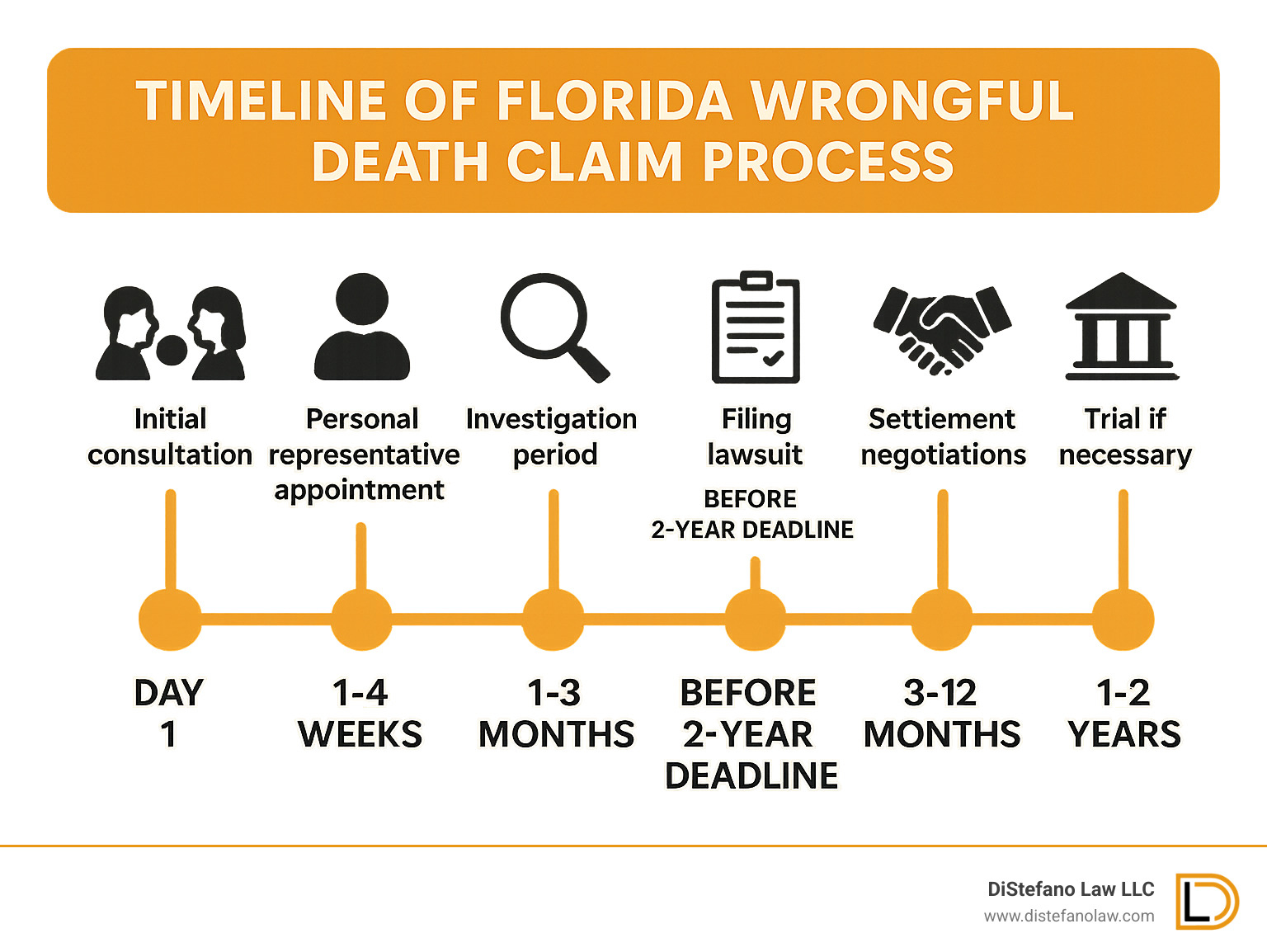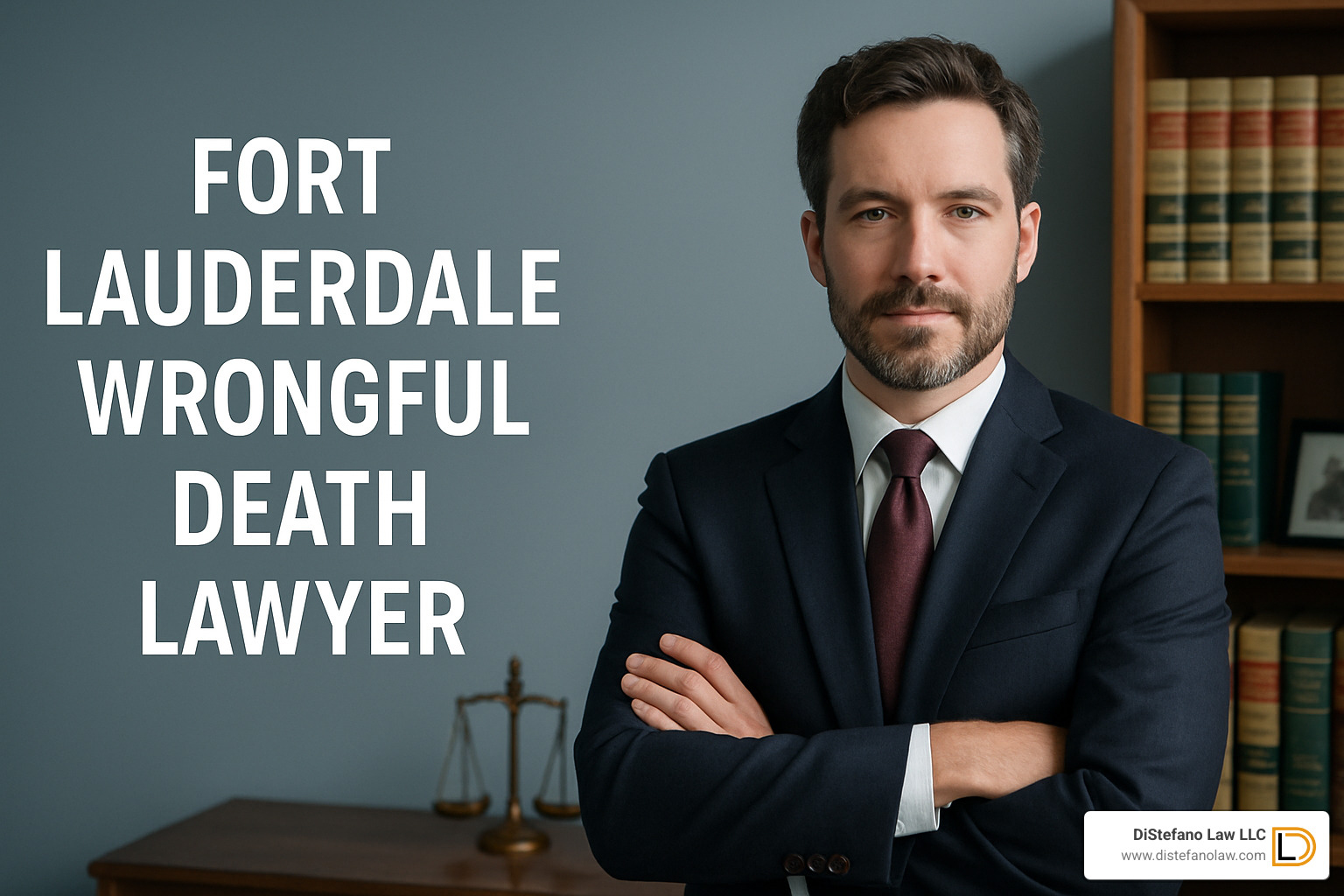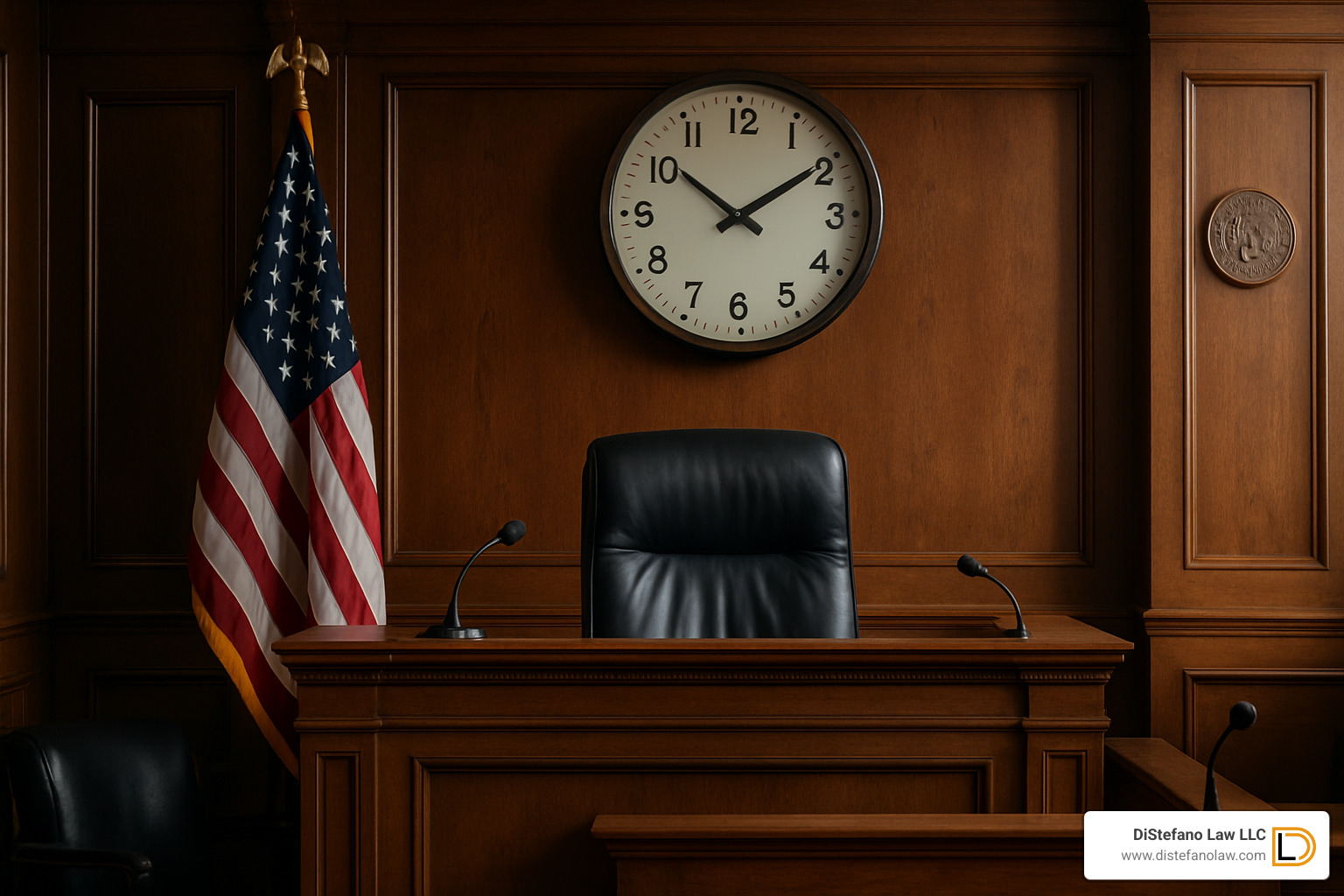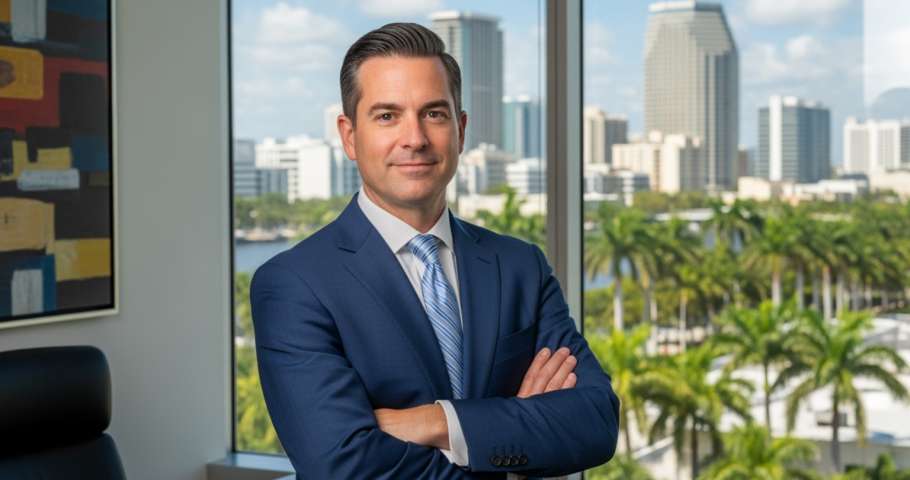When Tragedy Strikes: Understanding Your Rights After Losing a Loved One
If you’re looking for a Fort Lauderdale wrongful death lawyer, here’s what you need to know right away:
| Quick Facts: Wrongful Death Claims in Florida |
|---|
| Time Limit to File: 2 years from date of death (4 years for medical malpractice) |
| Who Can File: Personal representative of the deceased’s estate |
| Who Can Recover: Spouse, children, parents, and dependent relatives |
| Compensation Types: Medical expenses, funeral costs, lost income, pain and suffering |
| Florida Law: Governed by Florida Statutes §768.16-768.26 |
| Cost to Hire: Most work on contingency (no win, no fee) |
Losing someone you love due to someone else’s carelessness is devastating. The grief alone is overwhelming, but when you add medical bills, funeral expenses, and lost income, the burden can feel impossible to bear.
Here in Broward County, families face this painful reality more often than you might think. In 2017 alone, 3,116 Floridians lost their lives in car accidents. Thousands more died from medical errors, workplace accidents, and dangerous property conditions.
When another person’s negligence cuts a life short, Florida law provides a path to justice and financial recovery. But navigating this path while grieving requires guidance from someone who understands both the legal system and the human impact of your loss.
At DiStefano Law LLC, we believe you deserve clear information without confusing legal jargon. That’s why we’ve created this guide—to help you understand your rights, the legal process, and how a Fort Lauderdale wrongful death lawyer can help your family find justice and financial stability during this difficult time.

What Counts as Wrongful Death in Florida?
When someone’s life ends because of another person’s carelessness or intentional harm, Florida law calls this a “wrongful death.” Under Florida Statute §768.19, it’s defined as a death “caused by the wrongful act, negligence, default, or breach of contract” of another party.
Think of it this way: if your loved one would have had grounds to file a personal injury lawsuit had they survived, their passing likely qualifies as a wrongful death under Florida law.
Here in Fort Lauderdale, we see several common situations that lead to these heartbreaking cases:
Car, truck, and motorcycle accidents happen all too frequently on our busy Florida highways, especially when drivers are distracted, impaired, or reckless. Medical errors like surgical mistakes or medication mix-ups can turn a healing journey into tragedy. Defective products ranging from faulty car parts to dangerous medications cause preventable deaths every year.
Other situations include workplace accidents (particularly in construction), slip and falls on poorly maintained properties, drowning incidents in our many pools and waterways, nursing home neglect, and even pharmacy errors where the wrong medication or dosage is provided.

At the heart of these cases is the concept of “duty of care”—the legal responsibility we all have to act reasonably to avoid harming others. When someone fails in this duty and a death results, Florida law provides a path for families to seek both justice and financial support.
Fort Lauderdale Wrongful Death Lawyer Definition vs Criminal Case
A wrongful death case exists completely separate from any criminal charges that might result from the same incident.
When you work with a Fort Lauderdale wrongful death lawyer, you’re pursuing a civil case—not a criminal one. The difference matters for several reasons.
First, civil and criminal cases use different standards of proof. In a criminal case, prosecutors must prove guilt “beyond a reasonable doubt”—an extremely high bar. In a civil wrongful death case, we need to show a “preponderance of evidence,” meaning it’s more likely than not (essentially 51% certainty) that the defendant is responsible.
This difference explains why someone might be found not guilty in criminal court but still held responsible in a civil wrongful death lawsuit. Remember the O.J. Simpson case? He was acquitted of murder but later found liable for wrongful death in civil court.
Another key distinction: criminal cases seek punishment like jail time, while wrongful death lawsuits seek financial compensation for the family’s losses. And sometimes, punitive damages may be awarded in particularly egregious cases to punish truly reckless behavior.
Top Local Causes in Fort Lauderdale
Living and working in Broward County for decades has shown us patterns in wrongful death cases that reflect our unique local environment:
Motor vehicle accidents remain the leading cause of wrongful death in our area. Florida’s statistics are sobering—3,116 people lost their lives on our roads in 2017 alone. Our tourist-heavy traffic, busy highways, and year-round riding weather for motorcyclists create risks not seen in many other places.
Medical errors contribute significantly to wrongful deaths here as well. Studies suggest up to 98,000 Americans die annually from medical mistakes, making it the sixth leading cause of death nationwide. South Florida’s large healthcare system and aging population make these cases particularly common in our practice.
Our beautiful waterways and year-round warm weather make drowning incidents a tragic reality in Fort Lauderdale. From beach accidents to unattended pool incidents, these cases are heartbreaking and often preventable.
Premises liability cases—like fatal falls among our elderly residents or inadequate security leading to violent incidents—occur frequently in our urban setting. And with South Florida’s constant development, workplace accidents in construction and other industries claim lives every year.
Understanding these local patterns helps our team at DiStefano Law LLC build expertise in the types of cases our Fort Lauderdale neighbors are most likely to face. When tragedy strikes your family, this specialized knowledge becomes an invaluable asset in your pursuit of justice.
Who Can File & What Damages Are Available?
When you’ve lost someone you love, understanding who can take legal action and what compensation might be available is crucial. Florida law has specific rules about this process.
Who can file the lawsuit?
In Florida, only the personal representative of the deceased person’s estate can file a wrongful death lawsuit. This person is typically:
– Named in the deceased’s will, or
– Appointed by the court if there’s no will
While this personal representative handles the legal filing, they’re not acting alone. They represent both the estate itself and the surviving family members who are eligible for compensation.
Who can recover damages?
Florida Statute §768.21 clearly defines who qualifies as a “survivor” entitled to compensation:
Your relationship to the deceased matters tremendously here. Spouses have specific rights to compensation for lost companionship. Children (including adult children if there’s no surviving spouse) can recover for lost parental guidance. Parents, especially those who’ve lost minor children, have recovery rights too. Even blood relatives and adoptive siblings who depended financially on the deceased may qualify for compensation.
The estate itself can also recover certain expenses and losses that directly impacted the deceased’s assets.
When we talk about compensation in these cases, we’re looking at three main categories:
1. Economic Damages
These are the tangible financial losses your family faces. Think about the medical bills that piled up before your loved one passed away. The funeral and burial costs you’ve had to manage. The income your loved one would have earned to support the family. Even the value of household services they provided—from home maintenance to childcare—all have real financial worth that can be calculated and recovered.
2. Non-Economic Damages
Some of the most profound losses can’t be measured in dollars. The comfort of your spouse’s companionship. The guidance a parent would have provided to children. The emotional suffering you experience daily. Florida law recognizes these profound human losses and allows compensation for them.
3. Punitive Damages
In cases involving truly outrageous conduct—drunk driving, intentional harm, or extreme recklessness—punitive damages may be available. These aren’t based on what you’ve lost but are designed to punish wrongdoers and deter similar behavior.
| Damages Available to Survivors | Damages Available to the Estate |
|---|---|
| Loss of support and services | Medical and funeral expenses paid by the estate |
| Loss of companionship (spouse) | Lost earnings from injury to death |
| Loss of parental guidance (children) | Lost net accumulations (savings the deceased would have accumulated) |
| Mental pain and suffering | |
| Future loss of support and services |

How Compensation Is Split Among Family
The distribution of wrongful death compensation isn’t one-size-fits-all. Florida courts consider each family’s unique situation when determining how funds should be divided.
Your relationship to the deceased plays a major role. Spouses and minor children typically receive priority consideration, reflecting their greater dependence and loss. The degree of financial dependence matters too—those who relied heavily on the deceased for support generally receive larger portions.
Age makes a difference as well. Minor children (under 25 in Florida wrongful death cases) receive special consideration for their long-term loss of parental guidance. Each survivor’s individual losses are evaluated separately, recognizing that different family members experience different types of harm.
The personal representative doesn’t decide how to split the money. This distribution is determined either through court proceedings or settlement negotiations that specifically address what each family member has lost.
For example, a spouse might receive compensation for lost companionship that adult children wouldn’t qualify for, while minor children might receive funds for lost parental guidance that others don’t receive.
If your family lost a parent who left behind minor children but no spouse, those children are entitled to recover the full value of lost parental companionship and guidance—an important protection for children facing such a profound loss.
Taxability & Comparative Fault Rules
Tax Considerations
Here’s a small bit of good news during an otherwise difficult time: wrongful death settlements in Florida are generally not taxable. The IRS typically considers these settlements as compensation for personal physical injuries, making them non-taxable under Section 104 of the Internal Revenue Code.
There are a few exceptions worth noting. Any portion specifically allocated to punitive damages may be taxable. Interest earned on the settlement after you receive it is also taxable. And if you claimed medical expense deductions in prior years that are later reimbursed through the settlement, those amounts might be taxable.
We always recommend talking with a tax professional about your specific situation to avoid surprises later.
Comparative Fault Rules
Florida uses what’s called a “modified comparative fault” system with a 50% threshold. This legal principle can significantly impact your case.
If your loved one was partially responsible for the accident that caused their death, the compensation may be reduced by their percentage of fault. For instance, if the total damages were $100,000 and your loved one was 25% at fault, the recovery would be reduced to $75,000.
The crucial threshold is 50%. If your loved one was 50% or less at fault, your family can still recover damages (reduced by that percentage). But if they were more than 50% at fault, Florida law prevents recovery entirely.
This is precisely why having a skilled Fort Lauderdale wrongful death lawyer is so important. The defense will often try to shift blame to your loved one to reduce or eliminate their financial responsibility. We work diligently to present the facts accurately and protect your right to fair compensation.
The statute of limitations for most wrongful death claims in Florida is just two years from the date of death. Missing this deadline typically means losing your right to seek compensation entirely, which is why reaching out to a Wrongful Death attorney promptly is so important.
How a Fort Lauderdale Wrongful Death Lawyer Builds a Winning Case
When you’ve lost someone you love, the last thing you want to think about is gathering evidence and building a legal case. That’s where a compassionate Fort Lauderdale wrongful death lawyer steps in – to handle the complex legal work while you focus on healing.
At DiStefano Law LLC, we approach each case with both legal precision and genuine care for your family’s wellbeing. Our process begins with a thorough investigation into what happened and why. We often work alongside specialized investigators who help us uncover the full story behind your loved one’s passing.
Evidence is the foundation of any strong case, which is why we move quickly to preserve critical information. Skid marks fade, witnesses move away, and surveillance footage gets deleted – time truly is of the essence.

We don’t tackle these complex cases alone. Our team consults with trusted experts – medical specialists who can explain exactly what went wrong, accident reconstruction engineers who can demonstrate how a crash occurred, and economic analysts who can calculate the true financial impact of your loss. These professionals help us translate your family’s suffering into the language the legal system understands.
Every successful wrongful death case needs to establish four essential elements:
Duty of care – proving the responsible party had an obligation to act reasonably
Breach of duty – showing they failed to meet that obligation
Causation – demonstrating their failure directly led to your loved one’s death
Damages – documenting the emotional and financial losses your family has suffered
The evidence we typically gather includes police reports, medical records, witness statements, and any available video footage. We also look for cell phone records in distracted driving cases, vehicle “black box” data, and maintenance logs for equipment failures. In medical malpractice cases, we carefully review treatment records and consult with medical experts.
According to the Florida Highway Safety Report, understanding the specific circumstances of fatal accidents significantly strengthens a wrongful death claim. For instance, in alcohol-related crashes, establishing the defendant’s blood alcohol content can be powerful evidence of negligence.
Proving Negligence Step-by-Step
Proving negligence isn’t just about pointing fingers – it’s about methodically showing how someone’s actions or inactions led to tragedy.
We start by establishing the duty of care. This varies by situation: drivers must operate vehicles safely, doctors must provide competent care, property owners must maintain safe premises, and manufacturers must produce safe products. The nature of your case determines what standard we need to prove.
Next, we demonstrate how that duty was breached. This might involve police reports documenting traffic violations, medical charts showing deviations from standard care, maintenance records revealing neglected repairs, or testing showing product defects.
The critical step is proving causation – showing a direct link between the breach and your loved one’s death. This often requires expert testimony connecting the negligent act to the fatal injury. For example, in a medical case, we might need a specialist to explain how a doctor’s mistake directly led to a patient’s death.
Finally, we document all the damages your family has suffered. This includes tangible losses like medical bills and funeral expenses, but also the profound emotional impact – the loss of companionship, guidance, and support that can never truly be replaced.
Why Hire a Fort Lauderdale Wrongful Death Lawyer Early
I’ve seen it time and again – families who wait to seek legal help often face unnecessary challenges. Here’s why reaching out to a Fort Lauderdale wrongful death lawyer sooner rather than later makes a difference:
Evidence disappears quickly. Surveillance footage gets overwritten, accident scenes are cleaned up, and physical evidence can be lost or altered. When you hire us early, we can take immediate steps to preserve these crucial pieces of your case.
Memories fade. Even the most sincere witness will remember less as time passes. By interviewing witnesses promptly, we capture their observations while they’re still fresh and detailed.
Insurance companies don’t wait. They often contact grieving families immediately, hoping to secure statements that might limit their liability later. Having us by your side from the beginning means you don’t have to steer these difficult conversations alone.
With Florida’s two-year statute of limitations for most wrongful death cases, delays can literally cost you your right to seek justice. Don’t let the clock run out on your family’s claim.
Perhaps most importantly, early legal representation gives you space to focus on what truly matters – grieving your loss and supporting your family. While you take care of your emotional needs, we handle the complex legal process.
At DiStefano Law LLC, we understand that adding legal fees to your financial worries is the last thing you need. That’s why we offer Free Consultations and work on a contingency basis – you don’t pay unless we win your case. This approach ensures every family has access to quality legal representation during their darkest hours, regardless of their financial situation.
Filing Timeline, Costs & Settlement Process
When you’re grieving the loss of a loved one, understanding what lies ahead in a wrongful death case can provide some much-needed clarity. Let’s walk through what you can expect in terms of timeline, costs, and the overall process.
The journey begins with a simple conversation. During your free initial consultation with our team, we’ll discuss your situation with compassion, explain your options in plain English, and determine if you have grounds for a wrongful death claim. There’s no pressure—just clear information when you need it most.
If your loved one didn’t designate a personal representative in their will (or didn’t have a will), we’ll help establish one through the probate court. This person will officially represent the estate and family throughout the legal process.
Next comes the investigation phase, typically lasting 1-3 months. Our team carefully gathers evidence, consults with experts, and builds your case. We leave no stone unturned because we understand what’s at stake for your family.
The formal lawsuit must be filed within Florida’s two-year statute of limitations—a strict deadline that rarely offers exceptions. Missing this deadline can permanently bar your right to seek justice, which is why connecting with a Fort Lauderdale wrongful death lawyer early is so important.
Once filed, both sides exchange information through a process called findy. This includes document exchanges, written questions, and depositions (recorded interviews under oath). This phase typically takes 6-12 months and helps establish the facts of your case.
Throughout this process, we’ll be negotiating with the defendant’s representatives. Many cases resolve through settlement negotiations or formal mediation, where a neutral third party helps both sides reach an agreement. If a fair settlement isn’t possible, we’re fully prepared to present your case in court—typically a 1-3 day trial for most wrongful death cases.

Statute of Limitations Countdown
Think of the statute of limitations as a ticking clock that, once expired, locks the courthouse doors forever. For most Florida wrongful death cases, this clock runs for just two years from the date of death.
However, there are some important exceptions worth knowing:
Medical malpractice cases sometimes extend to four years if the malpractice wasn’t finded right away. For instance, if a surgical error wasn’t identified until months after a patient’s death, the family might have additional time to file.
When government entities are involved (like city buses or public hospitals), you must file a formal notice of claim within three years, with additional procedural requirements. These cases have special rules that must be strictly followed.
In rare circumstances, the clock may be “paused” or “tolled”—such as when a defendant conceals their identity or leaves the state to avoid responsibility. These situations are complex and require careful legal analysis.
The bottom line? Don’t wait. Even if you’re unsure about pursuing a case, a conversation with our team can help preserve your rights before time runs out.
Typical Case Timeline in Fort Lauderdale
While every case follows its own path, here’s what the journey typically looks like in Broward County:
Your first meeting with us happens right away—day one. Within 1-4 weeks, we’ll help establish a personal representative if needed. The next 1-3 months involve thorough investigation as we build your case.
We’ll file your complaint before that critical two-year deadline, and the defendant must respond within 20-30 days. The findy phase usually spans 6-12 months as both sides gather information.
Settlement negotiations happen throughout the process, but often intensify around 9-18 months after filing. If we need to go to trial, we’ll spend 1-2 months in careful preparation for what’s typically a 1-5 day trial.
Simple cases with clear liability might resolve within 6-12 months total. More complex cases involving multiple defendants or disputed liability can take 2-3 years. If there are post-trial motions or appeals, add another 1-2 years to the timeline.
Our local knowledge of Broward County courts and procedures helps us steer these timelines efficiently for our clients.
Budgeting for Justice
At DiStefano Law LLC, we believe financial concerns should never prevent families from seeking justice. That’s why we work on a contingency fee basis—you pay nothing upfront, and we only get paid if we win your case.
Our attorney fees typically range from 33-40% of your recovery, depending on case complexity and whether we need to go to trial. We also advance all case expenses—things like filing fees, expert witness costs, investigation expenses, and court costs—and these are reimbursed only if we secure compensation for you.
Expert witness fees can range from a few thousand dollars for standard experts to tens of thousands for specialists in complex cases. We carefully manage these expenses and discuss them transparently with you throughout the process.
When evaluating settlement offers, we help you understand the true value of your case by calculating all current and future economic losses, fair compensation for non-economic damages, and weighing the strength of the evidence. We’ll also consider the time value of money—an earlier settlement versus a potentially larger but delayed trial verdict.
This approach aligns our interests perfectly with yours—we succeed only when you do. It also means you can access top-quality legal representation regardless of your financial situation during this difficult time.
The path to justice after losing a loved one isn’t always short or simple, but you don’t have to walk it alone. Our Practice Areas page offers more information about how we help families like yours find their way forward.
Frequently Asked Questions about Fort Lauderdale Wrongful Death Lawyer
We understand you probably have questions during this difficult time. Here are straightforward answers to the most common questions we hear from families just like yours:
What is considered wrongful death under Florida law?
Florida doesn’t use complicated legal language to define wrongful death. According to Florida Statute §768.19, it’s simply a death caused by someone else’s “wrongful act, negligence, default, or breach of contract.”
Think of it this way: if your loved one could have filed a personal injury lawsuit had they survived, their passing likely qualifies as a wrongful death case. This includes deaths from car accidents, medical mistakes, unsafe property conditions, faulty products, and workplace incidents. The heart of these cases is that someone else’s carelessness or intentional actions led to your loved one’s death.
Who gets the money in a wrongful death settlement?
This is one of the most sensitive questions families face. In Florida, the money doesn’t automatically go to one person. Instead, it’s distributed among eligible family members based on their relationship to your loved one and their specific losses.
While the personal representative (executor) files the lawsuit, the compensation is meant for:
- Spouses, who can recover for lost companionship and emotional suffering
- Children under 25, who receive special consideration for lost parental guidance
- Adult children (particularly when there’s no surviving spouse)
- Parents (especially for the loss of minor children)
- Other blood relatives or adoptive siblings who depended financially on your loved one
The estate itself can also recover certain expenses, like medical bills and funeral costs paid by the estate, plus earnings lost between the injury and death.
How the money is divided isn’t arbitrary—it’s either determined by the court or carefully negotiated during settlement to reflect each family member’s unique loss.
Can I sue if my loved one was partly at fault?
Yes, you can—with some limitations. Florida uses what’s called “modified comparative fault” with a 50% threshold. In plain English, this means:
If your loved one was partially responsible—say 30% at fault—you can still recover damages, but they’ll be reduced by that percentage. So instead of receiving $100,000, you’d receive $70,000.
However, if your loved one was more than 50% responsible, Florida law doesn’t allow recovery.
This is exactly why having a dedicated Fort Lauderdale wrongful death lawyer is so important. Insurance companies and defendants often try to place more blame on the deceased person to reduce what they have to pay. We work tirelessly to counter these arguments and establish what really happened, ensuring your family receives fair compensation for your loss.
Asking these questions doesn’t mean you’re focused on money instead of grieving. It means you’re being practical about protecting your family’s future during an incredibly difficult time—something your loved one would want you to do.
Conclusion
Losing someone you love unexpectedly leaves a void that no legal action can truly fill. When that loss happens because someone else was careless or negligent, the pain often comes with a burning sense of injustice that makes grief even harder to bear.
For over 40 years, our team at DiStefano Law LLC has walked alongside families during their darkest moments. We’ve learned that while no court verdict or settlement check can replace your loved one, holding responsible parties accountable serves two vital purposes: it honors your loved one’s memory through justice, and it provides the financial stability your family needs to move forward.
As Fort Lauderdale wrongful death lawyers, we bring both legal expertise and genuine compassion to every case. Behind the legal documents and court proceedings, we never forget that real people are suffering real loss. We shoulder the complex legal burdens so you can focus on what matters most—supporting each other and beginning to heal.
Florida’s two-year statute of limitations creates a ticking clock on your right to seek justice. Waiting too long doesn’t just delay the process—it can permanently close the door on your ability to hold negligent parties accountable.
Whether your loss occurred in Fort Lauderdale, Lauderhill, Wilton Manors, Sunrise, or anywhere across South Florida, our team is ready to listen with compassion and respond with action. We’ll take the time to understand your unique situation, clearly explain your options without confusing legal jargon, and guide you through each step with the respect and dignity your family deserves.
The journey toward justice and healing begins with reaching out for help. Contact DiStefano Law LLC today for a free, no-obligation consultation. Let us help your family secure the justice and financial support you need to face tomorrow with greater peace of mind.




